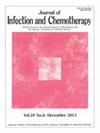Evaluation of the GeneSoC rapid quantitative PCR system for Treponema pallidum detection
IF 1.5
4区 医学
Q3 INFECTIOUS DISEASES
引用次数: 0
Abstract
The incidence of syphilis, caused by Treponema pallidum (TP), is increasing worldwide. Nucleic acid amplification tests, including quantitative PCR (qPCR), are valuable for diagnosing primary syphilis, particularly using ulcer/lesion swabs. Recent studies have also shown the promising diagnostic performance of nucleic acid amplification tests using saliva. The GeneSoC platform, a rapid qPCR system capable of completing 50 PCR cycles in 15 min, has been used for the diagnosis of infectious diseases, but has not been assessed for syphilis. This study aimed to evaluate the performance of the GeneSoC rapid qPCR assay for TP detection in clinical samples. We evaluated clinical specimens from ulcer/lesion swabs (syphilis, n = 43; non-syphilis, n = 20) and saliva (syphilis, n = 33; non-syphilis, n = 20). All syphilis samples were confirmed to be positive by conventional qPCR and stored before analysis with the GeneSoC rapid qPCR assay. The GeneSoC rapid qPCR assay had a detection limit for TP DNA of 20 copies/reaction, compared with 2 copies for the conventional qPCR assay. The results for the GeneSoC and conventional qPCR assays showed 100 % concordance for ulcer/lesion swabs. For saliva samples, the positive agreement rate was lower with crude DNA (63.6 %) but improved with purified DNA (84.8 %). The negative agreement rate was 100 % for both sample types. The GeneSoC rapid qPCR assay is a promising point-of-care test for primary syphilis using ulcer/lesion swabs. However, further optimization and validation, especially for saliva, are needed for its broader clinical use.
GeneSoC快速定量PCR系统检测梅毒螺旋体的评价
由梅毒螺旋体(TP)引起的梅毒发病率在世界范围内呈上升趋势。核酸扩增试验,包括定量PCR (qPCR),对诊断原发性梅毒很有价值,特别是使用溃疡/病变拭子。最近的研究也表明,利用唾液进行核酸扩增试验具有良好的诊断性能。GeneSoC平台是一种能够在15分钟内完成50个PCR循环的快速qPCR系统,已被用于传染病的诊断,但尚未对梅毒进行评估。本研究旨在评估GeneSoC快速qPCR检测TP临床样品的性能。我们评估了溃疡/病变拭子的临床标本(梅毒,n = 43;非梅毒,n = 20)和唾液(梅毒,n = 33;非梅毒,n = 20)。所有梅毒样本均经常规qPCR确认为阳性,并在GeneSoC快速qPCR分析前保存。GeneSoC快速qPCR检测TP DNA的检出限为20拷贝/反应,而传统qPCR检测为2拷贝/反应。GeneSoC和常规qPCR检测结果显示溃疡/病变拭子的一致性为100%。对于唾液样本,粗DNA的阳性符合率较低(63.6%),而纯化DNA的阳性符合率较高(84.8%)。两种样本类型的负一致率均为100%。GeneSoC快速qPCR检测是一种很有前途的使用溃疡/病变拭子检测原发性梅毒的即时检测方法。然而,进一步的优化和验证,特别是唾液,需要其更广泛的临床应用。
本文章由计算机程序翻译,如有差异,请以英文原文为准。
求助全文
约1分钟内获得全文
求助全文
来源期刊

Journal of Infection and Chemotherapy
INFECTIOUS DISEASES-PHARMACOLOGY & PHARMACY
CiteScore
4.10
自引率
4.50%
发文量
303
审稿时长
47 days
期刊介绍:
The Journal of Infection and Chemotherapy (JIC) — official journal of the Japanese Society of Chemotherapy and The Japanese Association for Infectious Diseases — welcomes original papers, laboratory or clinical, as well as case reports, notes, committee reports, surveillance and guidelines from all parts of the world on all aspects of chemotherapy, covering the pathogenesis, diagnosis, treatment, and control of infection, including treatment with anticancer drugs. Experimental studies on animal models and pharmacokinetics, and reports on epidemiology and clinical trials are particularly welcome.
 求助内容:
求助内容: 应助结果提醒方式:
应助结果提醒方式:


